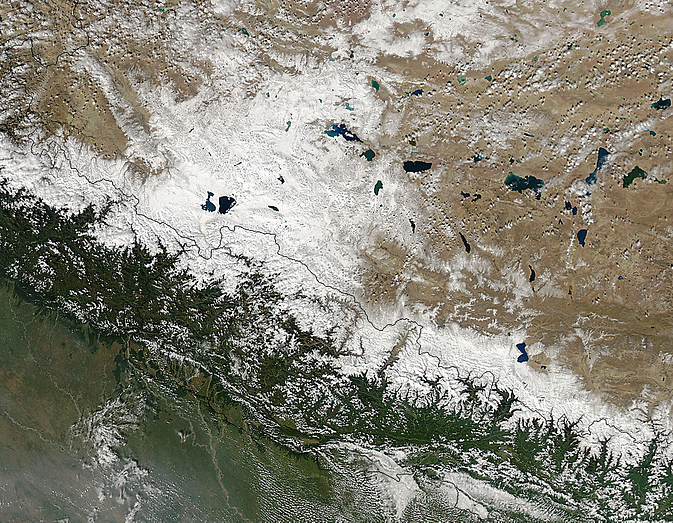NASA Sees Himalayan Snow from Cyclone Hudhud's Remnants

NASA's Aqua satellite passed over the Himalayan Mountains, the MODIS instrument captured this image of snow on the ground on Oct. 16 at 0705 UTC (3:50 a.m. EDT). Image Credit: NASA Goddard MODIS Rapid Response Team
Answer:
When it makes landfall in India and the moisture moves over the Himalayas as Cyclone Hudhud has done.
When NASA's Aqua satellite passed over the Himalayan Mountains, the MODIS instrument captured this image of snow on the ground on Oct. 16 at 0705 UTC (3:50 a.m. EDT).
Cyclone Hudhud made landfall in eastern India and moved over the Himalayas dropping snowfall in Nepal and southwestern China.
Rob Gutro
NASA's Goddard Space Flight Center
Media Contact
All latest news from the category: Earth Sciences
Earth Sciences (also referred to as Geosciences), which deals with basic issues surrounding our planet, plays a vital role in the area of energy and raw materials supply.
Earth Sciences comprises subjects such as geology, geography, geological informatics, paleontology, mineralogy, petrography, crystallography, geophysics, geodesy, glaciology, cartography, photogrammetry, meteorology and seismology, early-warning systems, earthquake research and polar research.
Newest articles

Sea slugs inspire highly stretchable biomedical sensor
USC Viterbi School of Engineering researcher Hangbo Zhao presents findings on highly stretchable and customizable microneedles for application in fields including neuroscience, tissue engineering, and wearable bioelectronics. The revolution in…

Twisting and binding matter waves with photons in a cavity
Precisely measuring the energy states of individual atoms has been a historical challenge for physicists due to atomic recoil. When an atom interacts with a photon, the atom “recoils” in…

Nanotubes, nanoparticles, and antibodies detect tiny amounts of fentanyl
New sensor is six orders of magnitude more sensitive than the next best thing. A research team at Pitt led by Alexander Star, a chemistry professor in the Kenneth P. Dietrich…





















